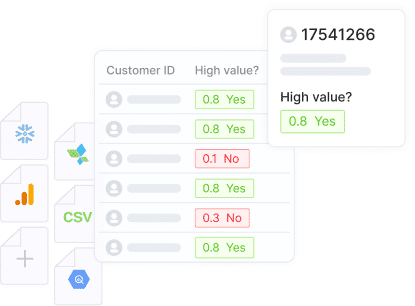In a nutshell:
- Generative AI (GenAI) is a powerful tool that can generate unique content and solve complex problems.
- Understanding the use cases of GenAI is crucial for businesses looking to harness its potential.
- GenAI can streamline operations, enhance customer experiences, and drive revenue growth.
- The intersection of generative and predictive AI offers new opportunities for innovation and problem-solving.
- The top 6 use cases for GenAI include customer experience personalization, customer service automation, fraud detection, supply chain management, predictive maintenance, and business process automation.
Once we had Microsoft Clippy, asking us incessantly if we needed help with a problem we weren't having. But now, we can have tools that not only correctly understand our needs, but anticipate them. With Generative AI (aka GenAI), we have a new digital companion capable of crafting unique content, solving complex problems, and even pushing the boundaries of artistic expression. Clippy doesn't stand a chance against these exciting GenAI tools and their varied use cases for innovation and imagination.
That's pretty intriguing — but you might still feel a bit adrift among all these possibilities. Because AI is such a new field for many industries, there’s still a lot of confusion around the benefits of AI — and precisely how and why GenAI matters for your business. Understanding the use cases of GenAI is crucial for companies looking to harness the potential of this technology and its future growth.
By exploring the potential applications for GenAI in your own organization, your business can identify how GenAI can streamline your operations, enhance customer experiences, and drive revenue growth.
Explore these use cases for GenAI to see which could make the biggest impact on your organization.
Understanding GenAI
Generative AI and predictive AI are two powerful technologies that have revolutionized the field of data analytics. While generative AI and predictive AI are often used together for maximum impact, there are key differences between the two models.
Defining Generative AI
Generative AI refers to the ability of artificial intelligence to generate new content, such as images, text, or even music, based on patterns and examples it has learned from.
This technology goes beyond traditional AI models that are limited to recognizing and analyzing existing data. Generative AI has a broad scope, enabling software to create original and unique outputs that mimic human-like creativity. It has applications in various fields, including art, design, content creation, and even drug discovery.
Defining Predictive AI
Predictive AI, on the other hand, focuses on analyzing existing data to make informed predictions and forecasts.
By employing machine learning (ML) algorithms, predictive AI can identify patterns and trends in large datasets, enabling businesses to make data-driven decisions and anticipate future outcomes.
This technology has widespread applications in industries such as finance, marketing, healthcare, and supply chain management. Predictive AI empowers organizations to optimize operations, mitigate risks, and gain a competitive edge.
The Intersection of Generative and Predictive AI
The intersection of generative and predictive AI holds immense potential for businesses. By combining the creativity of generative AI with the predictive capabilities of predictive AI, organizations unlock new opportunities for innovation and problem-solving.
For example, generative AI can generate synthetic data that augments existing datasets, enabling more accurate and diverse predictions. Additionally, generative AI can be leveraged to create realistic scenarios for testing predictive models, enhancing their accuracy and robustness.
Integrating generative and predictive AI may also lead to advancements in fields like personalized medicine, fraud detection, and autonomous systems.
For instance, a hospital could use generative AI to assist in generating personalized treatment plans based on a patient's unique characteristics, while predictive AI predicts and prevents potential fraudulent medical billing activities in real time.
6 Use Cases for Generative AI
Generative AI is gaining momentum across many industries. It’s quickly becoming the go-to tool for numerous professionals. The following use cases reflect this technology’s vast abilities.
GenAI Use Case 1: Customer Experience Personalization
One of the most impactful use cases for GenAI is customer experience personalization. By leveraging the power of generative AI and predictive AI, businesses create tailored and personalized experiences for their customers.
GenAI can generate personalized recommendations and offers. It can understand customer preferences and create relevant content and product suggestions. For example, an e-commerce platform could use GenAI to create images and text for personalized product recommendations based on a customer's browsing history and previous purchases, enhancing their shopping experience.
Improving customer experiences through GenAI yields numerous benefits for businesses in all industries.
Improved Customer Loyalty
GenAI enhances customer satisfaction and loyalty by delivering personalized experiences that resonate with individual preferences. This, in turn, leads to increased customer engagement, repeat purchases, and positive word-of-mouth referrals.
Higher Revenue
Personalized experiences often drive higher sales and revenue as customers are more likely to make purchases when presented with products or services that align with their interests.
GenAI-powered personalization will help businesses gain a competitive edge in crowded markets by differentiating themselves and building stronger connections with the audience.
Whether it's tailoring product recommendations, customizing marketing campaigns, or providing individualized support, GenAI empowers businesses to connect with customers on a deeper level.
In an era where customers expect personalized experiences, leveraging GenAI is a game-changer in driving customer satisfaction, loyalty, and business growth.
A major GenAI use case is customer service automation, including personalized chat.
GenAI Use Case 2: Customer Service Automation
Customer service automation is vital to modern businesses because it streamlines processes and enhances customer satisfaction. GenAI, with its advanced capabilities, optimizes customer service automation and revolutionizes how organizations interact with their target audiences.
Customer service automation involves using technology to automate various aspects of customer support, such as ticket management, contact centers, document processing, self-service portals, virtual assistants, and chatbots. It aims to provide efficient and consistent support while reducing your team’s manual efforts. Automation enables businesses to handle customer inquiries and resolve issues promptly.
Targeted Support
GenAI takes customer service automation to the next level by leveraging its predictive and generative capabilities. It can analyze large volumes of customer data to identify patterns and trends, enabling businesses to anticipate customer needs and proactively address their concerns. This helps in providing personalized and targeted support, enhancing customer satisfaction.
Chatbots
GenAI can power intelligent chatbots that understand and respond to customer inquiries in a natural and human-like manner. These chatbots handle routine queries, provide instant assistance, and even escalate complex issues to human agents when necessary.
By automating these interactions, businesses reduce response times, handle a higher volume of inquiries, and improve overall efficiency.
Automated Responses
Generative AI can generate automated responses based on historical customer interactions, ensuring consistency and accuracy in customer service. It can also assist in sentiment analysis, enabling businesses to gauge customer satisfaction levels and take appropriate actions to address any issues or concerns.
GenAI Use Case 3: Fraud Detection
Fraud detection through AI involves analyzing vast amounts of data, including text-based information, to identify patterns and anomalies that indicate potential fraudulent behavior.
Natural language processing (NLP), a branch of AI, focuses on understanding and processing human language. By applying NLP techniques, GenAI can analyze textual data, such as customer reviews, emails, and financial transactions, to uncover suspicious patterns, fraudulent activities, and potential risks.
GenAI's effectiveness in fraud detection lies in its ability to process and interpret vast amounts of textual data quickly and accurately. By analyzing the language used in customer reviews, for example, GenAI can identify patterns of fraudulent reviews or fake feedback, helping businesses maintain the integrity of their online reputation.
Generative AI can also analyze financial transactions and detect unusual patterns or anomalies indicating fraudulent activities, such as identity theft or unauthorized access. By continuously monitoring transactions and applying predictive analytics, GenAI flags suspicious activities in real-time, enabling businesses to take immediate action and prevent potential losses.
By leveraging GenAI for fraud detection, businesses safeguard their operations, protect their customers, and minimize financial losses.
GenAI can potentially assist with a variety of use cases related to supply chain processes.
GenAI Use Case 4: Supply Chain Management
GenAI, with its advanced capabilities, can significantly improve supply chain processes by analyzing unstructured data and extracting relevant information.
Supply chain management involves coordinating and optimizing various activities, including procurement, production, inventory management, and distribution. It aims to enhance operational efficiency, reduce costs, and improve customer satisfaction. Effective supply chain management requires accurate and timely information about inventory levels, supplier performance, demand patterns, and market trends.
Documentation Analysis
GenAI plays a vital role in improving supply chain processes by analyzing unstructured data, such as emails and documents, to extract relevant supply chain information. By applying NLP techniques, GenAI can understand and interpret textual data, enabling businesses to gain valuable insights and make data-driven decisions.
For example, GenAI can analyze documentation related to supplier contracts, identifying key terms, conditions, and performance metrics. This information can help businesses evaluate supplier performance, negotiate better terms, and identify potential risks or bottlenecks in the supply chain.
Feedback Analytics
GenAI can also analyze customer feedback, reviews, and social media data to gain insights into customer preferences and demand patterns. Use this information to optimize inventory levels, forecast demand accurately, and align production and distribution processes accordingly.
By leveraging GenAI's capabilities to analyze unstructured data, businesses enhance supply chain visibility, improve decision-making, and optimize operations.
GenAI Use Case 5: Predictive Maintenance
Predictive maintenance involves analyzing historical and real-time data from machines and equipment to predict when maintenance is required.
Businesses can identify patterns and anomalies that indicate potential failures by monitoring various parameters, such as temperature, vibration, and performance metrics. This enables them to schedule maintenance activities before a breakdown occurs, minimizing downtime and maximizing productivity.
Sensor Data Analytics
GenAI revolutionizes predictive maintenance when combined with predictive analytics and machine learning capabilities. These AI tools used together can identify patterns and correlations that indicate potential equipment failures by analyzing large volumes of data collected from sensors.
For example, AI can analyze machine temperature and vibration data to detect anomalies indicating a potential failure. It may also consider other factors, such as historical maintenance records, environmental conditions, and usage patterns, to provide more accurate predictions.
Continuous Improvement
GenAI continuously learns and adapts its predictive models based on new data, improving the accuracy of maintenance predictions over time. This helps businesses optimize maintenance schedules, reduce unnecessary maintenance activities, and allocate resources more efficiently.
By leveraging the power of GenAI in predictive maintenance, businesses proactively address equipment failures, minimize unplanned downtime, and extend the lifespan of critical assets. This improves operational efficiency, reduces maintenance costs, and enhances overall productivity.
GenAI Use Case 6: Business Process Automation
Business process automation streamlines and automates repetitive tasks and workflows to improve operational efficiency.
GenAI can automate data entry tasks by extracting relevant information from documents, such as invoices or forms, and populating the required fields in databases or systems. This eliminates the need for manual data entry, reducing the chances of errors and freeing up valuable time for employees.
You can even harness the technology to automate customer support processes by using natural language processing to understand customer inquiries and provide relevant responses or direct them to the appropriate resources. This improves response times, enhances customer satisfaction, and reduces the workload on support teams.
The Future of GenAI in Business
The future of GenAI in business is promising and transformative. GenAI will play a crucial role in driving innovation and efficiency across various industries as technology advances.
With its ability to analyze vast amounts of data, extract insights, and make accurate predictions, GenAI will enable businesses to make data-driven decisions, optimize operations, and enhance customer experiences.
As GenAI continues to evolve, it will become more accessible and user-friendly, allowing businesses of all sizes to leverage its power. The future of GenAI in business holds immense potential for growth, productivity, and competitive advantage.
Gaining a Competitive Edge with GenAI
From customer experience personalization to predictive maintenance, GenAI presents numerous opportunities for businesses to revolutionize their operations. That’s why Pecan’s automated platform uses the power of GenAI to get you up and running with predictive AI quickly and efficiently. Our Predictive GenAI makes it easier than ever to kickstart your predictive projects.
By leveraging both generative AI and predictive AI, your business can step into the future, harnessing the power of artificial intelligence and machine learning to drive growth and gain a competitive edge. GenAI is not just another piece of technology; it's a game-changer in business operations.
Schedule a demo with us today if you’d like to know more about how to incorporate AI into your business. We can help you understand how to apply them to your own industry in a way that will support and boost your success. And if you'd rather dive on in, sign up for a free trial now.







